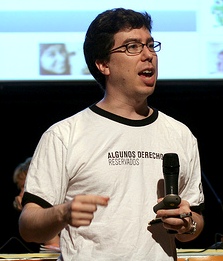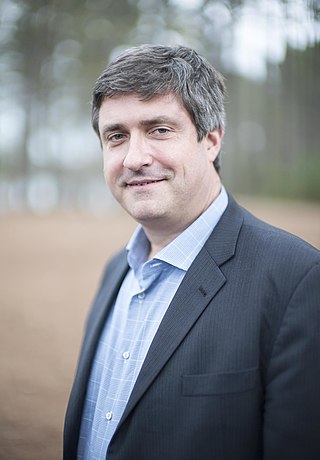Related Research Articles
The Electronic Privacy Information Center (EPIC) is an independent nonprofit research center established in 1994 to protect privacy, freedom of expression, and democratic values in the information age. Based in Washington, D.C., their mission is to "secure the fundamental right to privacy in the digital age for all people through advocacy, research, and litigation."

Jonathan L. Zittrain is an American professor of Internet law and the George Bemis Professor of International Law at Harvard Law School. He is also a professor at the Harvard Kennedy School, a professor of computer science at the Harvard School of Engineering and Applied Sciences, and co-founder and director of the Berkman Klein Center for Internet & Society. Previously, Zittrain was Professor of Internet Governance and Regulation at the Oxford Internet Institute of the University of Oxford and visiting professor at the New York University School of Law and Stanford Law School. He is the author of The Future of the Internet and How to Stop It as well as co-editor of the books, Access Denied, Access Controlled, and Access Contested.
Center for Democracy & Technology (CDT) is a Washington, D.C.–based 501(c)(3) nonprofit organisation that advocates for digital rights and freedom of expression. CDT seeks to promote legislation that enables individuals to use the internet for purposes of well-intent, while at the same time reducing its potential for harm. It advocates for transparency, accountability, and limiting the collection of personal information.
Technology governance means the governance, i.e., the steering between the different sectors—state, business, and NGOs—of the development of technology. It is the idea of governance within technology and its use, as well as the practices behind them. The concept is based on the notion of innovation and of techno-economic paradigm shifts according to the theories by scholars such as Joseph A. Schumpeter, Christopher Freeman, and Carlota Perez.

Michael Allen Geist is a Canadian academic, and the Canada Research Chair in Internet and E-Commerce Law at the University of Ottawa. He is the editor of four books on copyright law and privacy law, and he edits two newsletters on Canadian information technology and privacy law.
Christopher Wolf is an American attorney known for his career in Internet and privacy law. He was one of the first lawyers to practice Internet law and Privacy law. He is a retired partner in the international law firm of Hogan Lovells US LLP. He is the founding editor and lead author of the first Practising Law Institute (PLI) legal treatise on privacy and information security law. He is the founder and co-chair of a think tank devoted to emerging privacy issues, the Future of Privacy Forum. FPF serves as a catalyst for privacy leadership and scholarship, advancing principled data practices in support of emerging technologies. He also has chaired an international consortium of non-governmental organizations fighting online hate speech, the International Network Against Cyber-hate (INACH). Wolf graduated from Bowdoin College in 1976, and magna cum laude Order of the Coif from Washington & Lee University School of Law in 1980. He clerked with the Hon. Aubrey E. Robinson Jr., United States District Court, District of Columbia, 1980–1982.

Marc Rotenberg is president and founder of the Center for AI and Digital Policy, an independent non-profit organization, incorporated in Washington, D.C. Rotenberg is the editor of The AI Policy Sourcebook, a member of the OECD Expert Group on AI, and helped draft the Universal Guidelines for AI. He teaches the GDPR and privacy law at Georgetown Law and is coauthor of Privacy Law and Society and The Privacy Law Sourcebook (2020). Rotenberg is a founding board member and former chair of the Public Interest Registry, which manages the .ORG domain.

Annie Antón is an academic and researcher in the fields of computer science, mathematical logic, and bioinformatics.

The Family Online Safety Institute (FOSI) is an international nonprofit organization. It is registered as a 501(c)(3) tax-deductible nonprofit charity in the United States and a registered charity in the United Kingdom. FOSI was founded in February 2007 by Stephen Balkam, who had created the Internet Content Rating Association (ICRA). FOSI is chaired by Dave Pierce, Vice President of Public Affairs, NCTA.
The Electronic Frontier Foundation (EFF) is an international non-profit digital rights group based in San Francisco, California. The foundation was formed on 10 July 1990 by John Gilmore, John Perry Barlow and Mitch Kapor to promote Internet civil liberties.
The Global Network Initiative (GNI) is a non-governmental organization with the dual goals of preventing Internet censorship by authoritarian governments and protecting the Internet privacy rights of individuals. It is sponsored by a coalition of multinational corporations, global non-profit organizations, and academic institutions. David Kaye (academic) is the Independent Chair of the Board. Mark Stephens (solicitor) was the previous Independent Chair.

Christopher Michael Kelly is an American entrepreneur, attorney, and activist. From September 2005 to August 2009, he served as Chief Privacy Officer, first General Counsel, and Head of Global Public Policy at Facebook. As an early leader at Facebook, he helped shape it into one of the most successful businesses in history. In 2010, Kelly was a candidate in the Democratic primary for California Attorney General. Since his departure from Facebook and campaign for Attorney General, he has become an investor in films, restaurants, and technology start-ups. Kelly became a co-owner of the NBA's Sacramento Kings in May 2013.

Julie Simone Brill is an American lawyer who serves as Chief Privacy Officer and Corporate Vice President for Global Privacy, Safety and Regulatory Affairs at Microsoft. Prior to her role at Microsoft, Brill was nominated by President Barack Obama on November 16, 2009, and confirmed unanimously by the US Senate to serve as Commissioner of the US Federal Trade Commission on March 3, 2010. Brill served as a Commissioner of the Federal Trade Commission (FTC) from 2010 to 2016.
Stuart N. Brotman is an American government policymaker; tenured university professor; management consultant; lawyer; author and editorial adviser; and non-profit organization executive. He has served in four Presidential Administrations on a bipartisan basis and taught students from 42 countries in six separate disciplines — Communications, Journalism, Business, Law, International Relations and Public Policy. He also has advised private and public sector clients in more than 30 countries in five continents.
Michael Zimmer is a privacy and data ethics scholar. He currently is a professor in the Department of Computer Science at Marquette University and Director of the Center for Data, Ethics, and Society. Previously, he was on the faculty at the School of Information Studies at the University of Wisconsin–Milwaukee, and director of the Center for Information Policy Research. Zimmer is on the advisory board of the Future of Privacy Forum, and was on the executive committee of the Association of Internet Researchers from 2009-2016. He was the Microsoft Resident Fellow at the Information Society Project at Yale Law School from 2007-2008.
The Center for Copyright Information (CCI) is an American organization focused on advocacy and initiatives in support of copyright law. The CCI aims to educate the public about copyright law; coordinates with copyright owners and Internet service providers (ISPs) about issues related to online copyright infringement; assists with the design, implementation, review, and promotion of an online infringement notification and mitigation system ; collects and disseminates online infringement data; and promotes lawful means of obtaining copyrighted works. The organization was created as a partnership between industry associations, including the Motion Picture Association of America, the Recording Industry Association of America, and five major American Internet service providers.
Jules Polonetsky is an American lawyer and internet privacy expert from Brooklyn, New York, who currently serves as Chief Executive Officer of the Future of Privacy Forum. Polonetsky is co-editor of the Cambridge Handbook on Consumer Privacy, with co-editors Omer Tene and Evan Selinger.

Danielle Keats Citron is a Jefferson Scholars Foundation Schenck Distinguished Professor in Law at the University of Virginia School of Law, where she teaches information privacy, free expression, and civil rights law. Citron is the author of "The Fight for Privacy: Protecting Dignity, Identity, and Love in the Digital Age" and "Hate Crimes in Cyberspace" (2014). She also serves as the Vice President of the Cyber Civil Rights Initiative, an organization which provides assistance and legislative support to victims of online abuse. Prior to joining UVA Law, Citron was an Austin B. Fletcher Distinguished Professor of Law at Boston University Law School, and was also the Morton & Sophia Macht Professor of Law at the University of Maryland School of Law.

Bradford Lee Smith is an American attorney and business executive who became Vice Chairman of Microsoft in 2021, and President in 2015. He previously served as a senior vice president and general counsel from 2002 to 2015.

Ifeoma Yvonne Ajunwa is a Nigerian-American writer, AI Ethics legal scholar, sociologist, and tenured professor of law at the University of North Carolina School Of Law in the United States. She is currently a Visiting Fellow at Yale Law School's Information Society Project (ISP) and she has been a Faculty Associate at the Berkman Klein Center at Harvard Law School since 2017. From 2021–2022, she was a Fulbright Scholar to Nigeria where she studied the role of law for tech start-ups. At UNC Law, she is the Founding Director of the AI Decision-Making Research (AI-DR) Program at UNC Law where she designed and created the first ever clearinghouse for scholarship and research on AI and the Law. She was previously an assistant professor of labor and employment law at Cornell University from 2017–2020, earning tenure there in 2020.
References
- ↑ "FPF Supporters".
- ↑ "Advisory Board - Future of Privacy Forum". fpf.org/. Retrieved 2022-01-20.
- ↑ "FPF and Washington & Lee University Law School Announce Partnership" . Retrieved April 25, 2017.
- ↑ "Leaders Tapped to Oversee "Copyright Alert System"".